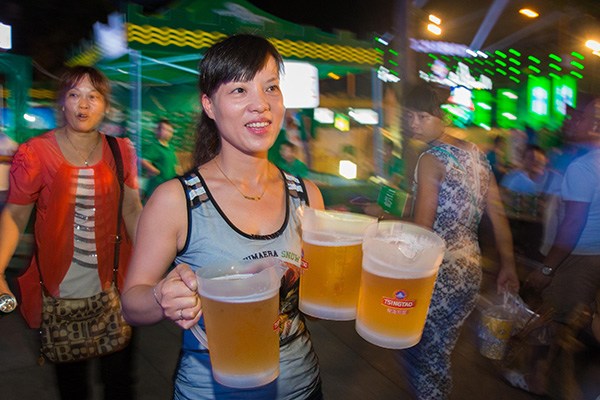
File photo of an attendant serving customers at a Tsingtao beer festival in Jiujiang, Jiangxi province. (Photo/China Daily)
Beer consumption in China saw the largest decline in five years last year, with domestic brands still dominating the market, according to industry experts and media reports.
Beer sales volume in China in 2015 dropped 5 percent to almost 48 billion liters compared with a year earlier. Sales in 2014 declined 1 percent year-on-year, said Joy Huang, research manager of Euromonitor International.
"A cool summer and the slowdown of the economy, plus consumers' increasing health awareness have been major factors behind the drop," Huang said. "There was less dining out and stricter control on drunk driving."
The beer market in China is maturing as total sales volume over the past few years has slowed and finally experienced a drop of 1 percent in 2014, according to a report released in December by Mintel Group Ltd.
The market also is consolidating, with the top five companies taking about 75 percent of the total volume. Smaller breweries make up a further 10 to 15 percent of market share, with the rest going to imports, according to Mintel.
Volume levels dropped, but the market total value has increased, partly as a result of increased marketing of premium brands by most companies.
Domestic brands still dominate the market, dwarfing foreign brands.
Only 1 percent of respondents surveyed as part of the report said they drink imports exclusively. The main reason is that foreign brands have yet to penetrate smaller cities like they have major cities. So consumer exposure to these beers often is small.
Imports usually are far more expensive than Chinese brews and such high prices deter lower-earning consumers from trying them, the report said.
The report found a lack of education about foreign beer brands and a preference for domestic beer have contributed for the disparity.
International brands must focus on increasing their visibility and exposure in China outside of major cities, the report said.
They also must consider altering their products for the Chinese market to make sure their beer strikes a chord with Chinese consumers' palates.
Also, 29 percent of those surveyed in the report said they believed imports were not available to buy, which is another challenge facing these brands, on top of the fact that many Chinese consumers do not have the disposable income to afford premium and foreign beers.
In China, Tsingtao and Snow have a comfortable lead in the market.
Budweiser is the most established Western brand in China and comes in fourth in popularity, according to the report. This is followed by Carlsberg and Heineken.
"Beer is considered very much a local product in China," said Joshua Channon, a research analyst for Mintel Group. "It is not uncommon for some beers to be among the top three beers drunk in their region of origin but barely even available in other parts of the country."
The report has found that Chinese consumers are demanding higher quality than simply mass produced, lower-priced lager. They are becoming more aware of the quality of ingredients.
Brands could benefit from adding details about the hops they use, for example, on packaging. That's especially so for foreign craft beers whose taste relies heavily on hops, the report notes.
It also says such brewers should find encouragement in a growing belief that rare beers are fashionable and reflect good taste.
The survey also found that beers that tout health and beauty benefits are magnets for many consumers.
Young women predominate in the group that cares about beauty, but health is an area of universal appeal. Rice-based ingredients and a light taste could prove to be very suitable for Chinese consumers, the report said.
The availability of beer on online shopping sites can help improve the sales of smaller brands among consumers outside of major cities.
However, the biggest increase has been in purchasing beer in supermarkets and convenience stores, giving brands a good opportunity to educate consumers with in-store product sampling, the report said.


















































